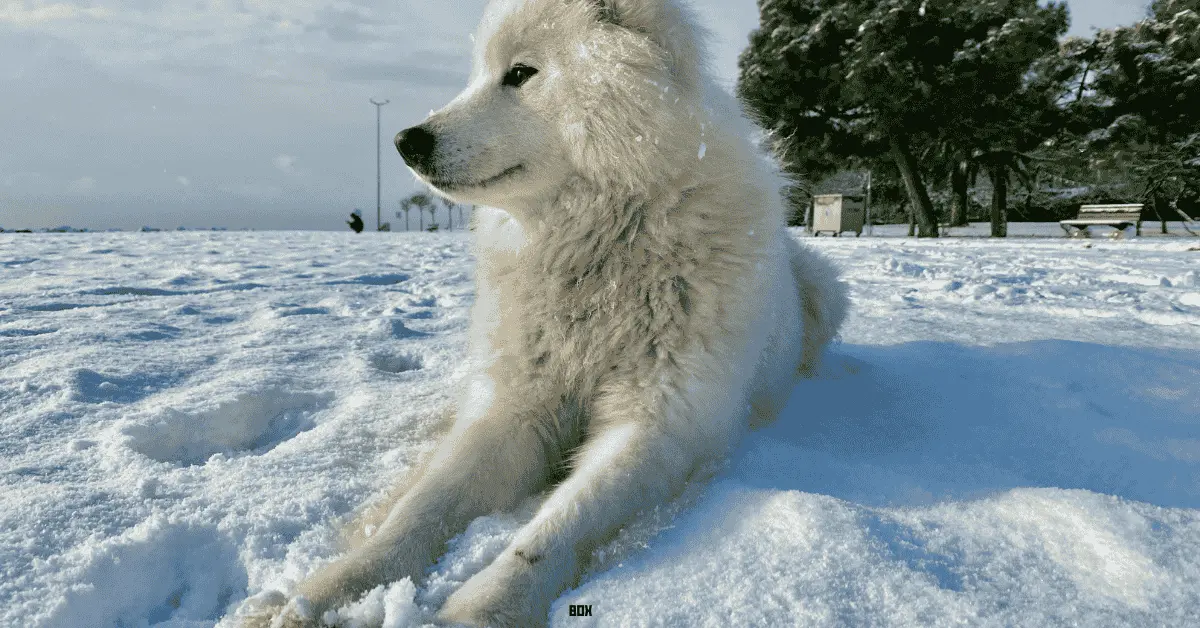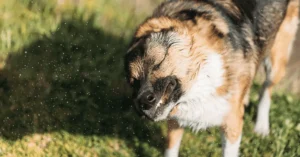Dogs are known for their loyalty, playfulness, and energy. They bring joy to our lives, and as pet owners, we want to ensure they stay happy and healthy. However, sometimes, they may begin to act weird—a change in behavior that can leave us confused and concerned. Whether your dog is shaking, panting, hiding, or showing signs of distress, it’s important to understand the potential causes and what steps you should take.
In this blog post, we will explore the common and not-so-common reasons why your dog might be acting restless or out of character. We’ll also provide practical advice on what you can do to improve their well-being.
Table of Contents
Toggle1. Health Issues That Could Cause Weird Dog Behavior
1.1 Health Problems and Pain
One of the most common causes of unusual behavior in dogs is health problems. If your dog is suddenly shaking, panting, or acting out of character, it’s possible they are experiencing pain or discomfort due to an underlying health issue.
-
Arthritis: Older dogs, especially, may develop arthritis, causing them to become more lethargic or act unusually. The pain can make them less willing to play, walk, or even eat.
-
Infections: A urinary tract infection (UTI) or dental infection could lead to discomfort that results in odd behavior, such as increased restlessness or agitation.
-
Toxins and Poisons: Sometimes, dogs ingest harmful substances, including chocolate, grapes, or even xylitol (a common sweetener). These toxins can cause rapid changes in behavior and health, such as vomiting, diarrhea, or trembling.
If your dog is acting weird, it’s always a good idea to schedule a vet visit for a full exam. They may need tests like blood work, stool samples, or x-rays to identify potential problems.
For more information on common dog health issues, visit American Veterinary Medical Association.
1.2 Age-Related Behavioral Changes
As dogs age, they can experience changes in their behavior due to age-related conditions such as dog dementia or cognitive dysfunction syndrome (CDS). Just like humans, dogs’ brains can deteriorate over time.
-
Symptoms: Disorientation, confusion, and restlessness at night can be signs that your dog is aging. They may start to pace, become anxious, or even forget previously learned commands.
-
Solutions: In some cases, medications and brain exercises can help manage symptoms and improve quality of life. Also, maintaining a consistent routine and environment is key.
For tips on managing aging pets, check out resources from The Humane Society.
2. Emotional Causes for Your Dog Acting Weird
2.1 Separation Anxiety
Dogs that become anxious when their owners leave are experiencing separation anxiety. This is a common problem, especially in dogs that have a very close bond with their owners. Symptoms of separation anxiety can include:
-
Whimpering or howling when left alone
-
Destructive behavior, like chewing furniture or scratching doors
-
Excessive barking or panting
If your dog is acting weird specifically when you’re about to leave or after you’ve been gone for a while, separation anxiety could be the culprit.
For more on separation anxiety in pets, visit PetMD.
2.2 Stress and Fear
Dogs are sensitive to their environments, and changes can lead to stress. Some common stressors include:
-
Loud noises like thunderstorms, fireworks, or gunshots
-
New family members or pets
-
Changes in routine such as moving homes or adjusting work schedules
If your dog shows signs of fear or stress-related behavior like trembling, hiding, or panting, it’s essential to understand the triggers and help them adjust gradually.
For further guidance on managing stress in dogs, see The American Kennel Club.
3. Behavioral Problems That May Be Behind Your Dog’s Weird Actions
3.1 Obsessive-Compulsive Behavior (OCD)
Some dogs develop obsessive-compulsive disorders (OCD), where they repeatedly perform certain behaviors like tail chasing, shadow chasing, or excessive licking. These behaviors can become disruptive and affect the dog’s quality of life. OCD is often linked to anxiety or a lack of stimulation.
3.2 Aggressive Behavior
Aggression in dogs can be triggered by fear, territoriality, or stress. If your dog starts growling, snapping, or biting, it’s important to evaluate what could be causing the aggression. Fear aggression is a common cause, often triggered by sudden changes in their environment or routine.
For tips on addressing aggressive behavior, visit The ASPCA.
4. When to Take Action: Seeking Professional Help
If your dog is acting weird and the behavior persists for more than a few days or worsens, it’s crucial to seek professional help. Here are some steps you can take:
-
Visit the Vet: A vet can perform tests to rule out any health issues. If medical problems are the cause, appropriate treatment will help.
-
Consult a Veterinary Behaviorist: If your dog’s strange behavior is linked to anxiety or OCD, a veterinary behaviorist can provide specialized treatment plans, including medication, training, or behavioral therapy.
-
Work with a Professional Trainer: Sometimes, behavioral issues are best addressed by a professional dog trainer who can guide you on how to correct negative behaviors.
For help in finding a veterinary behaviorist, visit the American Veterinary Society of Animal Behavior.
5. Practical Tips for Helping Your Dog Feel Better
5.1 Create a Calming Environment
If your dog is acting anxious or nervous, creating a calming environment can help. Here are a few tips:
-
Comfortable bedding: Make sure your dog has a quiet, comfortable spot to relax.
-
Soothing sounds: Playing calming music or white noise can help ease anxiety.
-
Exercise and play: Regular exercise and mental stimulation can help your dog stay relaxed and happy.
5.2 Consider Medication
In some cases, dogs with severe anxiety or compulsive behavior may benefit from medication prescribed by a vet. Medications can help manage anxiety and improve your dog’s overall well-being.
6. What If My Dog Is Suddenly Acting Weird After Eating?
Sometimes dogs display strange behavior after eating certain foods. Some dogs are sensitive to specific ingredients that can cause stomach upset or allergic reactions. Common causes include:
-
Food allergies: Ingredients like chicken, beef, or grains could trigger an allergic reaction.
-
Toxic substances: Certain foods, like chocolate, grapes, or xylitol, are toxic to dogs and can cause severe health issues.
If you notice your dog is acting weird after eating something specific, consult your vet for advice on what to avoid and how to switch to a safer diet.
For information on toxic foods for dogs, visit The Pet Poison Helpline.
7. How to Prevent Weird Behavior in the Future
Prevention is key to ensuring your dog remains healthy and happy. Here are some preventative measures:
-
Regular check-ups: Routine vet visits ensure your dog is healthy and free from hidden medical issues.
-
Behavioral training: Invest time in training to correct bad habits and foster good behavior.
-
Stress management: Help your dog cope with changes in the environment by gradually introducing new situations and offering comfort.
12 Signs Your Dog Is Acting Weird
-
Shaking or Trembling
Shaking can be a sign of stress, fear, pain, or even illness. -
Pacing or Restlessness
Restlessness often indicates anxiety, stress, or physical discomfort. -
Hiding or Avoiding You
Sudden isolation may signal discomfort, stress, or pain. -
Excessive Licking
Licking can indicate allergies, stress, or itchiness. -
Changes in Appetite or Drinking Habits
Sudden loss of appetite or increased thirst can indicate health issues. -
Unusual Barking or Whining
Excessive vocalization may be linked to anxiety or discomfort. -
Vomiting or Diarrhea
Frequent vomiting or diarrhea should be addressed immediately. -
Shying Away from Touch
Dogs that flinch when touched may be experiencing pain. -
Aggressive Behavior
Unexplained aggression may be a response to fear or pain. -
Excessive Sleeping or Lethargy
Lethargy could be a sign of illness or depression. -
Panting or Rapid Breathing
Rapid breathing or panting without physical exertion may signal anxiety or pain. -
Loss of Coordination or Balance
Disorientation and loss of balance may point to neurological issues.
Final Thoughts: Understanding and Supporting Your Dog
Dogs are more than just pets; they are family. When they start acting weird, it’s important to stay calm and gather as much information as possible to understand the root cause. Whether it’s a medical issue, anxiety, or a change in their environment, identifying the problem early can make a world of difference.
If your dog is experiencing unusual behavior, don’t hesitate to reach out for professional help. By providing the right care and attention, you can help your dog regain their usual happy, healthy self.
Related Posts:
FAQs
Why is my dog acting strange today?
Changes in a dog’s behavior can stem from medical issues, emotional stress, or environmental factors. If the behavior persists, a vet visit is advised.
How can you tell if your dog is unwell?
Look for signs such as lethargy, loss of appetite, vomiting, or excessive shaking. These can indicate underlying health problems.
Why is my dog standing still and acting strange?
This could be a sign of physical discomfort, neurological issues, or stress. Consult with a vet to rule out any medical problems.
What are signs of stress in a dog?
Common signs of stress in dogs include panting, shaking, restlessness, whining, and changes in behavior like chewing or licking.




